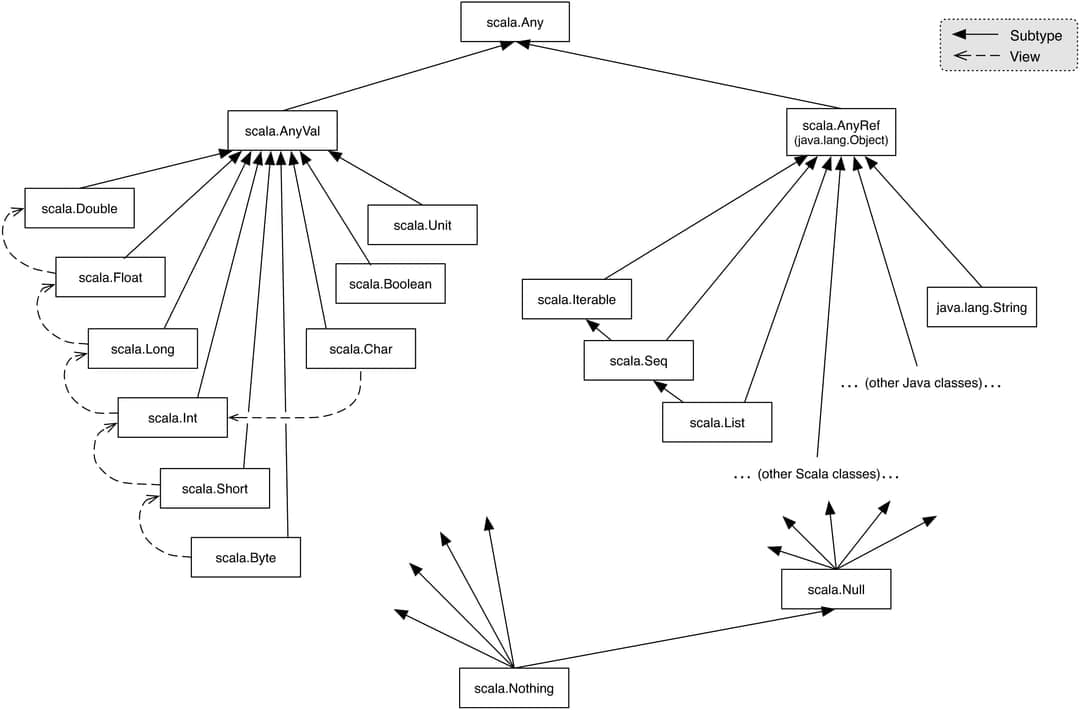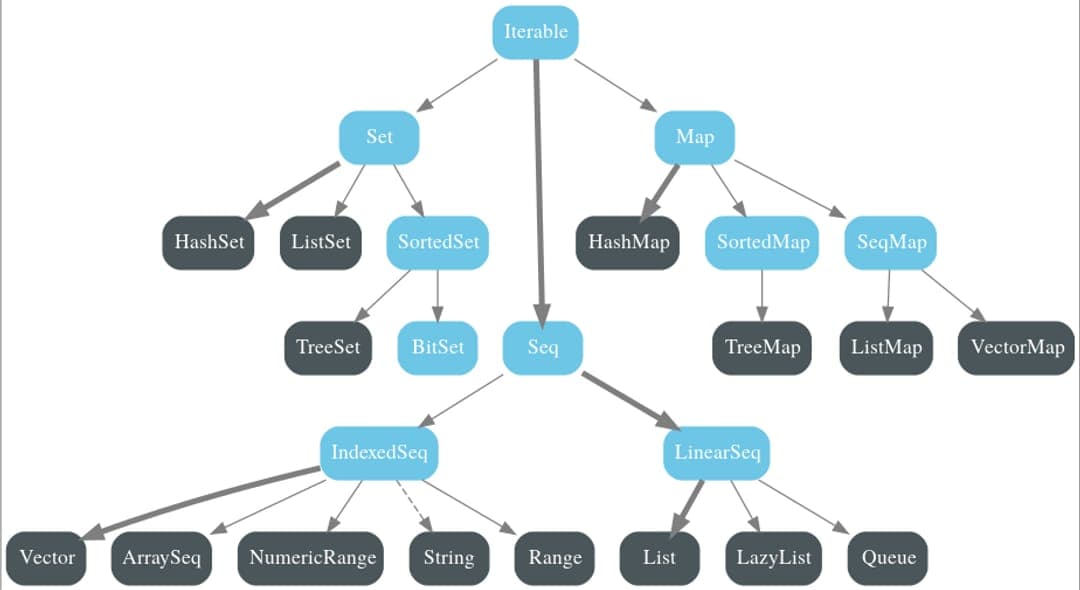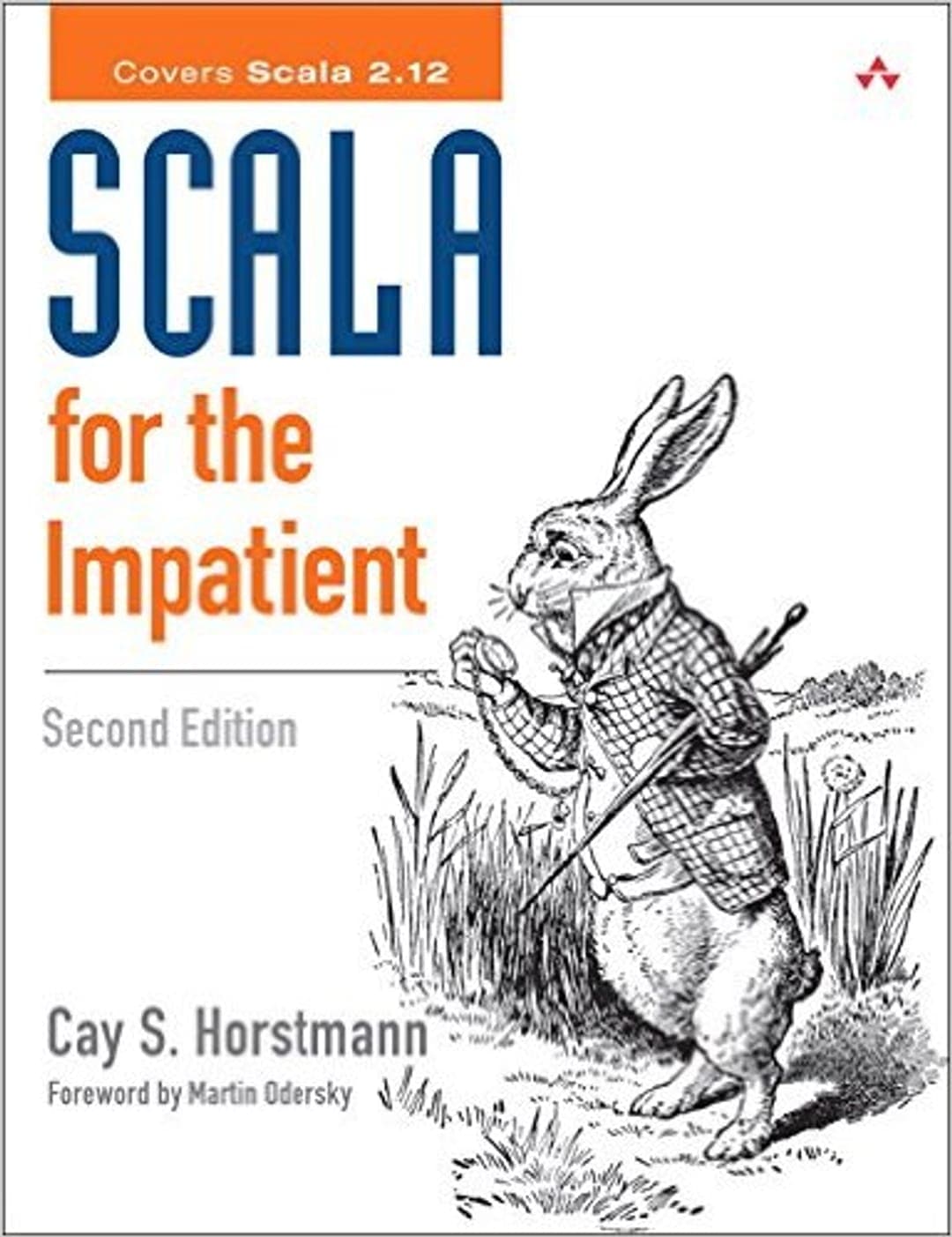Scala: The Good Parts
Scala allows you to accomplish tasks in different ways. I recently gave a talk explaining some of the more readable, maintainable approaches while attempting to add detail so the slides could stand on their own. The excellent reveal.js framework lets you create presentations in Markdown. This blog is also in Markdown, so through the power of copy/paste, here it is.
Scala Overview, Benefits Over Java
-
Created by Martin Odersky 17 years ago
-
Runs on the JVM
-
Can create Java objects, call their methods, and inherit from them in Scala and vice versa
-
Java collection interoperability
import scala.jdk.CollectionConverters._val javaList = java.util.Arrays.asList("Hi")val scalaList = javaList.asScalascalaList.foreach(println(_)) // Use any Scala collection methodsval backToJava = scalaList.asJava -
Type inference
List<String> msgs = Arrays.asList("Hi"); // This Java code...val msgs = List("Hi") // ..becomes this Scala code -
Concise
// This Java code...public class Person {private String name;public String getName() { return name; }public String toString() { ... }public boolean equals() { ... }public int hashCode() { ... }}Map<String, Integer> map = new HashMap<String, Integer>() {{put("a", 0);put("b", 2);}};// ...becomes this Scala codecase class Person(name: String)val map = Map("a" -> 0, "b" -> 1) -
Concurrency
- Immutability by default enables safe concurrency and parallelism
- Parallel collections, concurrent distribution with actors, asynchrony with futures
-
Traits
- Java interfaces with optional behavior, allows for safe multiple-inheritance
-
Pattern Matching
- More powerful
switch, match against class hierarchies, sequences, and more
- More powerful
-
Higher-order Functions
- Use functions anywhere and pass them to anything with type safety
-
Optioninstead ofnull, no moreNullPointerException! -
Functional paradigms and excellent collection methods
map,flatMap,filter,head,headOption,isEmpty,foreach,contains,find,zip,zipWithIndex,reduce,fold,sum,count,groupBy,mkString,sortBy
-
Automatically returns last statement without explicit
return, no semicolonsdef doubleIt(n: Int) = n * 2 // Returns `n * 2`, infers return Int type -
ifstatements are expressions, can have results// Java's ternary (`int x = condition ? result : defaultVal`) in Scalaval x = if (condition) result else defaultVal -
Powerful imports
// Rename importimport java.util.{HashMap => JavaHashMap}// Ignore HashMap, import everything elseimport java.util.{HashMap => _, _}// Follows scoping rulesdef someFn() = {import cats.implicits.toShow??? // Aside: This is valid Scala, throws NotImplementedError if hit}
Declaring variables
val items = Seq("1", "2") // Type inferredval typed: Seq[String] = Seq("1", "2") // Can optionally provide typevar mutable = 5 // Int, prefer val over varvar small: Short = 5 // Short, need type or inferred as Intval big = 5L // Long, need L or inferred as Intval bigger = 5.0F // Float, need F or inferred as Doubleval biggest = 5.0 // Doubleval javaType = new java.math.BigDecimal(5) // Java interopval byte: Byte = 0xa // Byte using hex notation, need type or inferred as Intval char = 'D' // Charval nothing = () // Unit, similar to void in Javalazy val deferred = ??? // Initialization deferred until first access
Classes
class Counter { private val myValue = 2 // No accessors generated val value = 1 // Only getter generated var mutableValue = 0 // Getter and setter generated, prefer val to var}class Person(val name: String) { // Primary constructor // Constructor body, initialize things here def this() { // Auxiliary constructor this("unnamed") // Must call primary constructor }}
Traits
- Like Java interfaces, but can have implementation
- Only difference between Scala class: cannot have constructor parameters
// Optionally sealed, barring extension outside file, useful for enumstrait Logger { def log(msg: String): Unit // Abstract method def info(msg: String): Unit = println(msg) // Implementation provided}// Mix as many traits into class as you like, constructed left to rightclass Logged(name: String) extends Person(name) with Logger { // Must implement abstract methods override def log(msg: String): Unit = ??? def logName(): Unit = info(name) // Using implementation in trait}
Objects
- Use for Singletons or home for misc values/functions
- Can extend classes or traits, cannot have constructor parameters
- Commonly used as "companion object" to classes for static functions
object Accounts { // Singleton private var lastNum = 0 def uniqueNum(): Int = { lastNum += 1; lastNum }}class Person private(val name: String)// Companion objectobject Person { // apply is special, called as `val p = Person("Rocky")` def apply(name: String): Person = new Person(name) // Called as Person.staticFn() as in Java def staticFn() = ???}
Trait Initialization Order Gotcha
trait MyTrait { // scalafix error: abstract val in trait // Use def, lazy val, or move to object instead val foo: Int // Defaults to 0 val bar = foo * 2 // Initialized prior to foo getting set to 20 by MyObject}object MyObject extends MyTrait { val foo = 20}MyObject.bar // 0 instead of 40 as expected!
Case Classes
- Special kind of class, immutable with implementations for
toString,equals,hashCodeapply, makingnewunnecessary on creationunapplyfor pattern matchingcopyfor immutable modifications
case class Person(name: String, age: Option[Int]) // No new requiredval r = Person("Rocky", None) // Calls applyprintln(r) // Person(Rocky,None)val b = r.copy(name = "Bob") // New object, r unchangedprintln(r == b) // falseprintln(r == r.copy()) // true

Option
- A much better
null - Calling
getif value isNoneresults in exception, no better thanNullPointerException - Instead, handle both
SomeandNonecases explicitly
val maybeName: Option[String] = Some("Rocky")maybeName match { // Good, but verbose case Some(n) => println(n.toUppercase) case None => println("N/a")}println(maybeName.fold("N/a")(_.toUpperCase)) // Better, but can be unclearprintln(maybeName.map(_.toUpperCase).getOrElse("N/a")) // Best for clarity// Wrap potentially null values in Optionval maybeVal: Option[Int] = Option(javaMethodThatMayReturnNull())// Conditionally set val with Option.whenval maybeId: Option[UUID] = Option.when(req.hasId)(req.getId)
Try
try someFn() catch { // Standard try with pattern matching catch case ex: IOException => ??? case t: Throwable => ???}// Try type can be chainedval res: Try[Int] = Try(someFn()) .flatMap(d => Try(someFn()) // Without flatMap, res would be Try[Try[Int]] .map(d / _) )res match { // Good, but verbose case Success(a) => println(a) case Failure(ex) => println(ex.getMessage)}res // Better, but can be unclear .fold(ex => println(ex.getMessage), println(_))res // Best for clarity and to pattern match .map(println(_)) .recover { case ex: IOException => println(ex.getMessage) }// To only need to handle failed caseres.failed.map(ex => println(ex.getMessage))
Either
// Return either an error or Widgetdef getById(id: UUID): Future[Either[NotFoundError, Widget]] = database .run("...") .map(_.toRight(NotFoundError()))// Handling the Either at service boundaryimplicit class FromEither[T](future: Future[Either[NotFoundError, T]]) { def completeWith(obj: T) = future.onComplete { // With pattern matching case Success(Right(res)) => // Successful future with Widget res case Success(Left(error)) => // Successful future with Error throw fromServiceEx(error) case Failure(error) => // Failed future throw error } // Same as above using map/fold def completeWith(obj: T) = future .map(_.fold( error => throw fromServiceEx(error)), // Successful future with Error res => res) // Successful future with Widget ) .recover { case error => throw error } // Failed future}

-
Prefer immutable, they're safer and still performant
-
Map: key/value pairs, similar to Java'sHashMapval myMap = Map("a" -> 0, "b" -> 1)myMap("b") // 1// Looping over map, also shows string interpolationmyMap.foreach{ case (k, v) => println(s"$k -> $v") } -
Tuple: aggregates of values, useful for multiple returns in class's private methods. Prefercase classreturn types for public methods for readability.val myTuple = (1, 3.14, "Fred")myTuple._2 // 3.14 -
Seq: general purpose, similar to Java'sListval mySeq = Seq(3, 2, 1)mySeq.filter(_ > 1).sorted.zipWithIndex.foreach { case (v, idx) => print(s"$v at $idx ") }// 2 at 0 3 at 1 -
Set: distinct elements, similar to Java'sHashSet -
IndexedSeq: fast random access and count, similar to Java'sArray -
List: fast beginning and end operations, similar to Java'sLinkedList
Pattern Matching
- Preferable to casting via
asInstanceOf,isInstanceOf
obj match { // Type matching case x: Int | Long if x < 10 => x // Multi-match with if guards case s: String => Integer.parseInt(s) // No cast needed, s is now String case _ => 0 // Default case, often required to avoid MatchError}Seq(0, 1, 2) match { // Collection matching case Seq(x, y) => s"$x $y" // List equivalent, case x :: y :: Nil case Seq(0, _*) => "0 ..." // List equivalent, case 0 :: tail case _ => "Not matched"}person match { // Case class/Option matching case Person("Rocky", age) => println(s"Rocky is $age") case Person(name, Some(_)) => println(name) case _ => println("Not matched")}
Additional Reading

For more on learning Scala, check out my Scala Learning Resources.